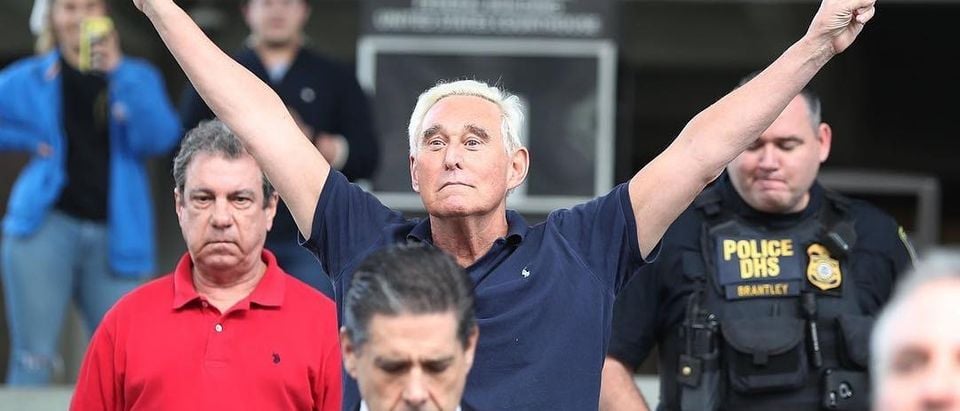The reason for conducting a SWAT raid in the pre-dawn hours is the element of surprise. Most people are sleeping at this time and adjusting to such a situation from a sound sleep takes time — time during which a SWAT team can swiftly take control of a dangerous felon. It is particularly useful during a hostage rescue or other apprehension of very dangerous individuals.
Apparently, it is also required when arresting a 66-year-old man for lying.
In questioning whether we are overusing SWAT teams in a law enforcement capacity, the FBI gives plenty of fodder for discussion. Tactical teams for the FBI have been involved in some famously disastrous incidents as witnessed in Ruby Ridge and Waco. In fairness, both of those incidents were started by the then-Bureau of Alcohol, Tobacco, and Firearms (ATF) and then concluded by the Federal Bureau of Investigations. However, the use of pre-dawn raids is relatively common for SWAT teams on any law enforcement agency.
Political consultant Roger Stone has been a high profile person for many years. Nothing in his history indicates he would be a flight risk, or that he was a threat to law enforcement. He even indicated as far back as May of 2018 that he was expecting the possibility of an indictment, and still took no steps to flee despite his significant resources.
Nonetheless, FBI agents in battle gear pounded on his front door while he was asleep in bed. Was it the proper procedure?
To their small credit, the FBI waited a short period of time and allowed him to answer the door rather than breaching it. However, choosing the pre-dawn hours to conduct such an operation made the latter a very real possibility as it takes longer for someone to come to the door if they are in a sound sleep than if they were eating dinner in the dining room. Roger Stone opted for the cooperative opening of the door despite being awakened from a sound sleep.
We know this because CNN was on the scene as it happened. While CNN’s statement is that their reporter was there on a “hunch,” federal law enforcement is notorious for bringing media with them on such operations. We saw this in Waco at the Branch Davidian raid, where four ATF agents were killed in a pre-planned raid with media on scene. If law enforcement wants to capture the incident on camera, they certainly have ways to do this without involving the media beforehand.
Bringing media or notifying them of a pending raid runs the risk of compromising the element of surprise; the very reason for using such tactics in the first place. Furthermore, it puts innocent people in danger for the sole purpose of capturing a “perp walk” on camera.
It does not seem that a target such as Roger Stone would be difficult to get in contact with through an attorney and simply have him turn himself in. He knew an indictment was a possibility. His offenses in the indictment were all non-violent. They all involved lying in some fashion, an offense that poses exactly zero threat to the arrest team.
While this is not a commentary on the validity of the charges Stone faces, the most cursory of risk assessments would place him very low on the threat scale. Was there a compelling government interest in arresting him at his home in the pre-dawn hours besides the obvious publicity that a news crew can give to the operation? I have yet to hear a legitimate reason for such tactics.
Keep in mind that federal agencies, particularly the FBI, do not do policing. They are law enforcement agencies. Police officers are an integral part of our communities; part of the daily structure of our cities, towns, and counties. They know the people in their jurisdiction, often live among them, and are a central part of the community both on and off duty. Enforcing laws is a small part of their overall mission within the service they provide to their communities.
Federal law enforcement, by contrast, is simply a law enforcement operation without any of the other responsibilities or activities that would make it a part of a community. The difference between policing and law enforcement changes the calculus for accountability.
Is surprise the best way to avoid violent confrontation in every situation? When a violent response by the person to be arrested is nearly unavoidable, such as in a hostage/barricade situation or terrorism suspect, then it can help minimize the violence a suspect can inflict on the SWAT team or on innocent persons inside a residence. For low-risk suspects, using tactics such as pre-dawn raids or “no knock warrants” could actually increase the possibility of a violent encounter.
Randy Petersen is a senior researcher for Right on Crime and the Center for Effective Justice at the Texas Public Policy Foundation.
The views and opinions expressed in this commentary are those of the author and do not reflect the official position of The Daily Caller.












